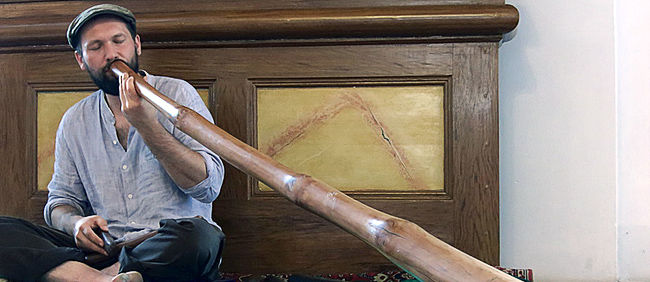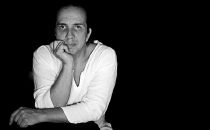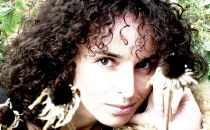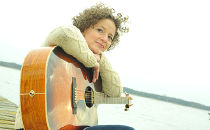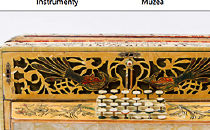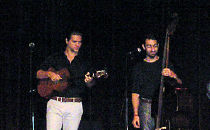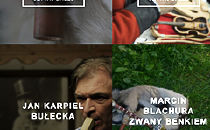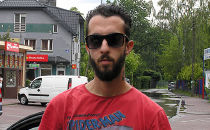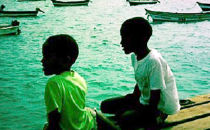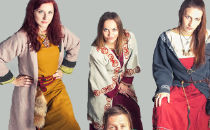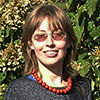How it happened that years ago you took a didgeridoo and started playing? Were you fascinated by Australia and Aboriginal culture or were there other reasons?
I found didgeridoo in 1990 - it was a street artist who was performing some free form music on the plastic tube. I didn’t know that it was a didgeridoo. Then I had just realized that the concept of the rezonance of the tube, was someting calling me to try.
Is a didgeridoo a difficult instrument to master? How long has one to practice to be a good player?
Didgeridoo has at least two sides: traditional and experimental-contemporary. I am interested with full respect in both- traditional and experimental. I've been still searching the way how to fit this ancient concept to the today's world. For me, to master this instrument is a never-ending story...
You have created your own, contemporary style of play, combining different genres of music like ambient, techno, break beat. What do you like best in your play?
Every life chapter has some challenges, in music as well. I like all of my sides. And I think I am getting older and probably gentlier, heh.
During your life you have collaborated with many famous and world-known artists, including opera ones. Which of these collaborations turned out to be the most interesting and unpredictible for you?
Hard to answer. I am not a classical trained musician, I am self-educated. My subject for many years of the universities study was fine art (The Academy of Fine Arts in Prague - ed. n.). So every musical collaboration is a new and good lesson. I like all of them, every time I learn something. What's more, I do not plan all these works. I just meet the right person, in the right moment, and we both know that we want to do something together.
You have already visited our country so far. What were your impressions after the first visit in Poland, after the concerts – what was the audience like?
I guess, I' ve played in Poland for more than 10 years now. And I like how Polish people feel music. There is some Slavic roots, which give us some unique connection to music. I like to play in Poland.
Have you ever thought of collaboration with a Polish musician or a Polish band?
If I meet at the right time the right people, why not!
You are coming to Poland very soon (21-22 February) to run a weekend workshop in Warsaw. What do you usually do with your students during such short classes?
I try to open their creative side, to enjoy this instrument forever. I like moments of teaching. It is very beautifull.
Tell me more please about the idea of electro-didgeridoo project called Autopilote.
It was a great project, connecting many great musicians, but our life paths took different directions. But it is ok. I like our CD that we recorded in 2008, called "IDO".
You‘ve been collaborating with people playing on Tibetan gongs. Have you ever heard from the audience how it influences their health?
It would take a long time to answer properly... I collaborate with musicians playing symphonic, Chinese and Vietnamese gongs. I think gongs generally have a very strong influence on the listener, and a lot depends on who is going to play and for who, and why.. So, I am very conscious, when we use those instruments. But, first I try to fulfill my intuitive musical intension with gongs and terapeutical will always well follow.
Apart from being a musician, you also build instruments. In Australia Aborigines make didgeridoos mostly from the eucalyptus tree. How it is in Europe - which tree is the most suitable, also in terms of sound?
Here I can answer in short: if you tend to build a traditional style instrument, use traditional timber. Eucalyptus, stringybark, yellowbox, bloodwood. If you tend to experiment with sounds, try all the materials, (including timber) you can!
Has your play ever been commented by the native Aborigines? If yes, what did they say about "white man" from distant Europe playing not always sacred tunes (techno, breakbeat) on their holy instrument?
Most traditional players - elders- they are masters and servants of their thousand years tradition, for them I am somebody very difficult to understand. For the young generation of Aborigines, I am quite the opposit- easy to understand, because they already living world as I do.
I am very much interested in your sound installation with Japanese artist Yas-kaz. Tell me a few words about it.
Yas kaz is a great artist, and we were playing together on the glass crystal objects in Prague 2012. He invented a few very innovative percussions and I was playing on the crystal didgeridoo...
What is "Orbis Pictus" and how would you describe its idea? Would it be possible to see it in Poland?
"Orbis Pictus" is a group of artists from all around the world, who participate together on the interactive art. Sounding objects, visual moving, touchable, etc. It is a huge collection of big objects you can play all day. We've been exhibiting our art in many great places. We can come to Poland for sure! But, this project is a full time job for many people and needs a big production. Anybody who is interested in it, can contact me, and I can forward all the details.
What are your upcoming plans (after workshop in Poland)?
Right now, I am trying to find the publisher for my new CD with a singer Jaz Coleman. After Poland I am on my way to Australia, and meanwhile I am working on opera L2, which will consist of my music, inspired by didgeridoo principles.
At the end - where can we find you in the internet?
My official website is www.smeykal.com. I' ve also got official facebook profile run by my manager. There you can find information about all of my activities.
Thank you very much for your time and answers!
